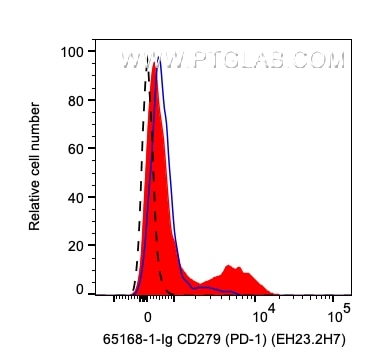Anticorps Monoclonal anti-PD-1/CD279
PD-1/CD279 Monoclonal Antibody for FC
Hôte / Isotype
Mouse / IgG1, kappa
Réactivité testée
Humain, primates non humains
Applications
FC
Conjugaison
Non conjugué
CloneNo.
EH12.2H7
N° de cat : 65168-1-Ig
Synonymes
Galerie de données de validation
Applications testées
| Résultats positifs en cytométrie | PHA treated human PBMCs, |
Dilution recommandée
| Application | Dilution |
|---|---|
| This reagent has been tested for flow cytometric analysis. It is recommended that this reagent should be titrated in each testing system to obtain optimal results. | |
| Sample-dependent, check data in validation data gallery | |
Informations sur le produit
65168-1-Ig cible PD-1/CD279 dans les applications de FC et montre une réactivité avec des échantillons Humain, primates non humains
| Réactivité | Humain, primates non humains |
| Hôte / Isotype | Mouse / IgG1, kappa |
| Clonalité | Monoclonal |
| Type | Anticorps |
| Immunogène | Recombinant human CD279 protein |
| Nom complet | programmed cell death 1 |
| Masse moléculaire calculée | 288 aa, 32 kDa |
| Numéro d’acquisition GenBank | BC074740 |
| Symbole du gène | PD-1 |
| Identification du gène (NCBI) | 5133 |
| Conjugaison | Non conjugué |
| Forme | Liquide |
| Méthode de purification | Purifié par chromatographie d'affinité par protéine A |
| Tampon de stockage | PBS with 0.09% sodium azide |
| Conditions de stockage | Store at 2-8°C. Stable for one year after shipment. |
Informations générales
Programmed cell death 1 (PD-1, also known as CD279) is an immunoinhibitory receptor that belongs to the CD28/CTLA-4 subfamily of the Ig superfamily. It is a 288 amino acid (aa) type I transmembrane protein composed of one Ig superfamily domain, a stalk, a transmembrane domain, and an intracellular domain containing an immunoreceptor tyrosine-based inhibitory motif (ITIM) as well as an immunoreceptor tyrosine-based switch motif (ITSM) (PMID: 18173375). PD-1 is expressed during thymic development and is induced in a variety of hematopoietic cells in the periphery by antigen receptor signaling and cytokines (PMID: 20636820). Engagement of PD-1 by its ligands PD-L1 or PD-L2 transduces a signal that inhibits T-cell proliferation, cytokine production, and cytolytic function (PMID: 19426218). It is critical for the regulation of T cell function during immunity and tolerance. Blockade of PD-1 can overcome immune resistance and also has been shown to have antitumor activity (PMID: 22658127; 23169436).
Protocole
| Product Specific Protocols | |
|---|---|
| FC protocol for PD-1/CD279 antibody 65168-1-Ig | Download protocol |
| Standard Protocols | |
|---|---|
| Click here to view our Standard Protocols |


